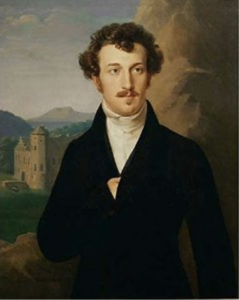Moonlight
(Poet's title: Mondenschein)
Set by Schubert:
D 875
for TTBBB quintet with piano[January 1826]
Des Mondes Zauberblume lacht,
Und ruft mit seelenvollem Blick
In unsre düstre Erdennacht
Der Liebe Paradies zurück.
Vom mächt’gen Arm des Schlafs besiegt,
Erstarben Sorge, Schuld und Pein,
Das Zarte nur und Schöne fliegt
Entfesselt in den Geisterreih’n.
Doch seht! die Fluren sind vertauscht,
Das ist die alte Erde nicht,
Ein Silbergarten, duftumrauscht,
Voll Nebelschmelz und Zauberlicht.
Den Geist, vom ird’schen Drucke frei,
Umwallt der Sehnsucht Ätherkleid,
Er trinkt in stiller Schwärmerei
Des Himmels volle Seligkeit.
Doch mahnt das Lied der Nachtigall
An seine Welt das weiche Herz,
In aller Wonne weckt ihr Schall
Den tiefsten Schmerz, der Liebe Schmerz.
The magical flower of the moon is laughing,
And with a soulful glance it is calling
To us in our gloomy night on earth
Back to the paradise of love.
Conquered by the powerful arms of sleep,
Care, guilt and pain have died away,
Only what is tender and beautiful flies up
Unfettered into the ranks of the spirits.
But look! The fields have been transformed,
This is no longer the old earth,
A silver garden, pervaded by fragrance,
Full of burning mist and magical light.
The spirit, liberated from earthly pressure,
Is wrapped in longing’s ethereal cloak,
In quiet enthusiasm it is drinking
The total bliss of heaven.
But the song of the nightingale offers a reminder
Of its world to the soft heart. –
Its song, with all its happiness, awakens
The deepest agony – the agony of love!
All translations into English that appear on this website, unless otherwise stated, are by Malcolm Wren. You are free to use them on condition that you acknowledge Malcolm Wren as the translator and schubertsong.uk as the source. Unless otherwise stated, the comments and essays that appear after the texts and translations are by Malcolm Wren and are © Copyright.
☙
Themes and images in this text:
Ether Fields and meadows Flowers Heaven, the sky Laughing Longing and yearning Magic and enchantment Mist and fog Night and the moon Nightingales, Philomel Silver Sleep Smells
In the moonlight our sensations and senses are both heightened and dulled. We fall asleep and escape our cares, guilt and pain; we look out on the landscape and the day-time world is transformed by a magical light which lifts our spirit. We experience both ecstatic fulfilment and an urgent longing. The silver garden that is revealed is pervaded by a fragrance. The sense of smell is as involved as sight in our response to the world of moonlight. The sense of touch is affected too: we lose awareness of the earth pressing down on us and we feel that we have been wrapped in strange clothing, a coat or cloak (made of ‘ether’) of yearning.
And then comes the sense of hearing. We overhear the singing of the nightingale. Poets have equivocated over the message here. Is it a pure celebration of joy, or is it some sort of lament? Is it a celebration of requited love or an expression of loneliness? Schober manages to retain the ambiguity: it is both the sound of total happiness and of the deepest agony, the agony of love.
☙
Original Spelling and notes on the text Mondenschein Des Mondes Zauberblume lacht, Und ruft mit seelenvollem Blick In unsre düstre Erdennacht Der Liebe Paradies zurück. Vom mächt'gen Arm des Schlafs besiegt, Erstarben Sorge, Schuld und Pein, Das Zarte nur und Schöne fliegt Entfesselt in den Geisterreih'n. Doch seht! die Fluren sind vertauscht, Das ist die alte Erde nicht, Ein Silbergarten, duftumrauscht, Voll Nebelschmelz und Zauberlicht. Den Geist vom ird'schen Drucke frei Umwallt der Sehnsucht Ätherkleid, Er trinkt in stiller Schwärmerei Des Himmels volle Seligkeit. Doch mahnt das Lied der Nachtigall An seine Welt das weiche Herz. - In aller Wonne weckt ihr Schall Den tiefsten Schmerz - der Liebe Schmerz! When Schober published this poem in his Gedichte of 1842, he called it Vollmondnacht (Night of the full moon) and the wording was as follows (with changes in bold). Des Mondes Silberblume lacht, Und ruft mit seelenvollem Blick In unsre düstre Erdennacht Der Liebe Paradies zurück. Vom mächt'gen Arm des Schlafs besiegt, Entschlummert Sorge, Noth und Pein, Das Zarte nur und Schöne fliegt Entfesselt in den Freudenreihn. Doch seht! die Fluren sind vertauscht, Das ist die alte Erde nicht, Ein Feengarten, duftumrauscht, Voll Nebelschmelz und Zauberlicht. Der Busen athmet leicht und frei, Von roher Lebenslast befreit, Und trinkt in stiller Schwärmerei Des Himmels volle Seligkeit. Doch mahnt das Lied der Nachtigall An seine Welt das weiche Herz. - In aller Wonne weckt ihr Schall Den tiefsten Schmerz - der Liebe Schmerz!
Confirmed by Peter Rastl with Gedichte von Franz von Schober. Stuttgart und Tübingen. J. G. Cotta’scher Verlag. 1842, page 42; and with Gedichte von Franz von Schober. Zweite, vermehrte Auflage. Leipzig Verlagsbuchhandlung von J. J. Weber. 1865, pages 53-54.
Note: Schubert received all poems from Schober in handwritten form. A (possibly later) autograph of this poem with the title Mondenschein is kept in the Vienna City Library.
To see an early edition of the text, go to page 42 [60 von 292] here: http://digital.onb.ac.at/OnbViewer/viewer.faces?doc=ABO_%2BZ20766660X


